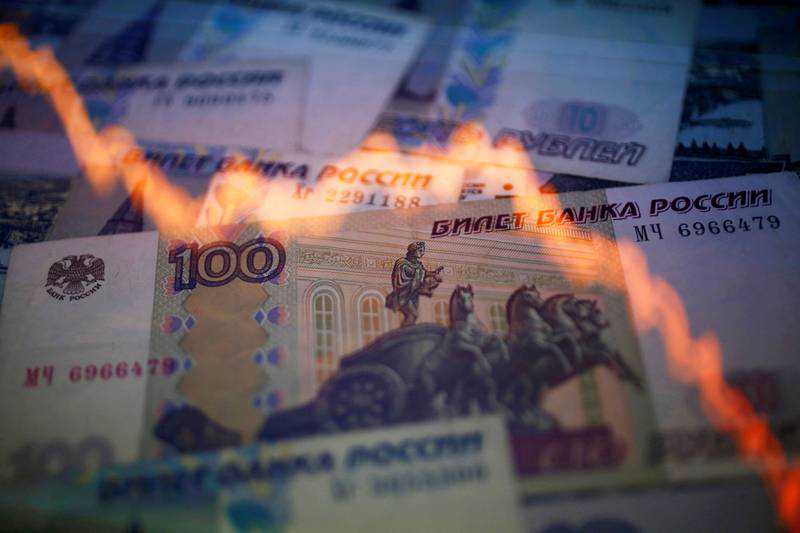Russia's rouble plunges to record new low following tighter sanctions
28 February, 2022

Russia’s rouble plunged more than 28 per cent to a record low of 118 against the dollar in early trading on Monday, after the US and EU allies imposed tighter sanctions in response to its military offensive in Ukraine.
The currency clawed back some territory but was still down 18 per cent as of 7.58am UAE time on Monday, at 100.2 to the greenback.
"A bank run has already started in Russia over the weekend, and the rouble ... will be well above $100 to the US Dollar," said Jeffrey Halley, senior market analyst at Oanda.
Inflation will immediately spike and the Russian banking system is likely to be in trouble, he said. Russia's central bank intervened in the foreign exchange market last week to defend the rouble by selling some of its reserves. On Monday, Russia’s central bank barred its brokers as of 7.00am local time from carrying out sell orders from foreigners to contain the impact on the financial market from sanctions. It also said it would boost liquidity by freeing 733 billion roubles ($8.78 billion) in local bank reserves.
"Most non-Russian banks will be reluctant to settle the other side of any rouble trade, and I have no doubt compliance officers are having a busy morning. The rouble was trading domestically near 150 over the weekend as Russians caused a bank run in the rush to change savings into hard currencies," said Mr Halley.
The currency's dive comes after the US and European allies disconnected certain Russian banks from the global Swift payments network, in addition to various tougher sanctions aimed at tightening the noose around Russia's economy.
Last week, Washington and the EU also took measures to limit Russia's ability to do business in dollars, euros, pounds, and yen. They also froze Russian assets and denied Moscow access to their financial markets limiting their ability to raise funding.
Trading on the Moscow's benchmark MOEX Index, which usually starts at 6.50am local time was suspended on Monday. Instead, trading on the stock market would start at 9.50am and the beginning of trading on the derivatives market at 10.00am, the bourse said. Last Thursday, the stock market briefly suspended trading after it plunged more than 45 per cent and closed 33 per cent lower, making it the fifth-worst plunge in stock market history.
Oil prices have rebounded upwards after receding below $100 a barrel on Friday.
Brent, the benchmark for two thirds of the world's oil, was up 4.77 per cent trading at $102.60 per barrel at 8.01am UAE time on Monday. West Texas Intermediate, the gauge that tracks US crude, was also 5.61 per cent higher at $96.73 per barrel.
Despite Western measures, the US and EU have notably not placed sanctions on Russia’s energy and commodity industries, which are integral to the global economy. Russia is among the world's biggest producers of oil and natural gas, in addition to nickel, aluminium, palladium, cobalt, copper, wheat and barley.
In 2020, Russia produced about 10.2 million barrels a day of crude oil and natural gas condensate, placing it second after the US, with Saudi Arabia in third place, according to the 2021 BP Statistical Review of World Energy. It is also the second-largest producer of natural gas in the world.
Consultancy Wood Mackenzie said Russia’s economy is in a better position to withstand sanctions than it was in 2014 when it annexed Crimea.
"The conflict hurts Ukraine’s economy most. If energy flows are affected, the global impact could be severe. Neither Russia nor the western allies will want to disrupt flows, but it cannot be ruled out," said Wood Mackenzie.
Russia has built a reserve cushion that could soften the impact of sanctions short term, the consultancy said.
"Being frozen out of international bond markets means new sovereign debt needs to be financed domestically. Reserves cover the $50 billion due in principal repayments on government debt through 2025."
As for Ukraine, the conflict risks disrupting the country's economic activity and damage its capital stock sending it back to a recession this year unless the situation de-escalates, Wood Mackenzie said.
Oil prices could hit $130 a barrel by June if the Ukrainian conflict disrupts Russian crude flows and surge beyond that if the crisis escalates further, according to industry analysts.
Enhanced sanctions on Russia led to a rebound in the price of gold. Bullion, a hedge against inflationary pressures and a safe haven for investors, was up 1.18 per cent to $1,911.21 an ounce at 9.09am UAE time. It had hit $1,970.90 last week, its highest since January 2021, but then weakened on Friday after the US and EU sanctions stopped short of targeting Russia's energy and commodity industries.
Source: www.thenationalnews.com
